North Korea continues to dominate the headlines amid growing concerns about its alarming advances in nuclear weapons capabilities. The incendiary rhetoric from both Washington and Pyongyang, the North’s testing of two ICBMs, and its sixth and largest nuclear test led to U.S. shows of force, including sending B-1B bombers further north of the demilitarized zone than any U.S. fighter jet or bomber has gone in the 21st century.
In the past several months, despite the tough talk about “military options” by President Trump and his senior officials, North Korean leader Kim Jong-un continues to defy the international community. Amid escalating tensions, he issued a rare, if not unprecedented, personal statement against the U.S. president, calling him “the mentally deranged U.S. dotard.” His behavior—and the ongoing U.S.-North Korea tension—is stoking fears about the possibilities of a nuclear war or a bloody military conflict.
How did we get to this point? What is driving Kim Jong-un and how can we explain North Korea’s provocative actions this summer?
An aggressive track record
Frankly, Kim has been hurtling toward these advanced nuclear weapons capabilities since he came to power in December 2011. Lately, he has been bigger, badder, and bolder.
In the past six years, Kim Jong-un has conducted four nuclear tests and tested close to 90 ballistic missiles, more than his father and grandfather combined. And in those six years, he has yet to meet with any foreign head of state—his most significant exchanges with foreigners have been with a Japanese sushi chef and U.S. basketball player Dennis Rodman. He has also rebuffed Chinese attempts to rebuild ties and refused to engage with the United States and South Korea.
His father, Kim Jong-il, on the other hand, bargained and negotiated with the United States, South Korea, and Japan, at least paid lip service on denuclearization, and maintained good ties to China, the North’s primary benefactor.
Personality matters. Kim is unlikely to back down in the face of President Trump’s public challenges and come to the negotiating table. He wants to look tough domestically and externally and show who is driving events on the Korean Peninsula. In fact, he has more national and international political leadership experience than Trump, who has been president for less than a year, and South Korean President Moon Jae-in, who came into office in May.
Kim’s statement calling President Trump “mentally deranged” and promising the “highest-level of the hardline countermeasures” shows that he has taken ownership of this showdown and that he alone—as the leader of North Korea—will defend the country’s survival, as well as its dignity. Kim also has a bias for action and he wants to win, as the Kim family’s former sushi chef recalled, and as Kim’s recent behavior has shown. Not only has Kim Jong-un grown up in a cocoon of indulgence and privilege, he has inherited advanced nuclear weapons that probably have enhanced and enabled his tendencies to berate and bully even the president of the United States.
Let’s not forget that the regime has shown to be extremely sensitive to any criticism about Kim Jong-un himself. For example, in 2014, the regime said that the release of the movie “The Interview”—a comedy depicting an assassination attempt against Kim—would be “an act of war.” North Korean hackers also threatened 9/11-type attacks against theaters that showed the film.
Kim probably calculated that he could cross these major thresholds without major blowback because he saw, first, an opportunity with a U.S. president who has been the subject of domestic and international criticism; and, second, a U.S.-South Korea alliance that appeared wobbly. China and Russia, meanwhile, have publicly stated that they would not allow instability on the Korean Peninsula, watering down some of the harshest aspects of U.N. sanctions and cautioning against U.S. military action against Pyongyang. This signaled to Kim that China—and Russia—would serve as a measure of protection against destabilizing sanctions and a potential U.S. or South Korean attack.
It is important to note that Kim has been emboldened in general. He’s gotten away with a lot since December 2011: scores of missile test launches, nuclear tests, the probable VX nerve agent attack against his half brother in Malaysia, the 2015 incident involving a landmine in the demilitarized zone, the Sony hack in 2014, and the mistreatment and death of U.S. citizen Otto Warmbier. And he’s conducted several purges of senior North Korean leaders including executing his uncle, Jang Song Thaek in 2013, deterring any potential opposition to Kim’s rule.
Finally, although Kim is aggressive, that does not mean that he is reckless or a “madman.” In fact, he knows how and when to recalibrate. Note that his personal statement threatened “highest level” countermeasures in response to Trump’s threats, but he didn’t say when and he didn’t say how, consistent with Pyongyang’s past tactic of maintaining ambiguity and preserving its options, including diplomatic, kinetic, or covert activities.
Kim is highly unlikely to abandon his nuclear deterrent, as Trump’s threats gave fresh reminders of what happens to those countries when they give up nuclear weapons.
Changing the calculus
So, while we are unlikely to be headed for a nuclear war or a military conflict in the near future, we should worry about the lessons Kim is learning from this latest episode of “Kim vs. Trump” and how these lessons would increase the likelihood of a deadly confrontation or miscalculation that could quickly spiral out of control.
First, President Trump’s threats reinforce North Korea’s narrative of a “hostile” outside world and that the United States is determined to destroy North Korea. Kim is highly unlikely to abandon his nuclear deterrent, as Trump’s threats gave fresh reminders of what happens to those countries when they give up nuclear weapons. And as new generations of North Koreans come of age in a nuclear North Korea, I fear denuclearization will become a naïve dream.
Second, even if North Korea and the United States came to an agreement, Kim has no reason to think that an agreement would stick from one U.S. administration to the next, given Trump’s sharp criticism and talk of “revisiting” the Iran nuclear deal. The message is loud and clear: The United States cannot be trusted.
Third, the U.S.-South Korean alliance is not impenetrable. President Trump tweeted his criticism about the South Korea-United States free trade agreement around the time of the 4th nuclear test and accused the South Korean government of “appeasement with North Korea.”
South Korea is finding, as I have told them, that their talk of appeasement with North Korea will not work, they only understand one thing!
— Donald J. Trump (@realDonaldTrump) September 3, 2017
Finally, in North Korea’s view, China is not to be trusted, but Chinese leaders will not abandon Pyongyang because it is in Beijing’s interest to keep propping up Kim’s regime.
How do we change Kim’s calculus? How do you negotiate with someone who thinks he’s winning and doesn’t want to talk at all?
- At a minimum, tone down unnecessarily inflammatory, and apparently uncoordinated, statements from President Trump. There’s no need to spoon feed the North Korean propaganda machine with easy soundbites about a “hostile” United States—or to unnerve our South Korean ally about the risks we are prepared to take with its security.
- Be steady and methodical about strengthening and reinforcing Washington’s alliances with South Korea and Japan and reassuring our regional partners that the United States is serious about their security. Optics matter. North Korea is watching to exploit any cleavages in the alliance, and the Trump administration should make every effort to ensure no daylight between Washington and Seoul.
- Give the latest executive order that authorizes broad secondary sanctions a chance to work. These sanctions have the potential to squeeze North Korea’s ability to earn hard currency for the regime. Sanctions that undermine Kim’s ability to reward elites and severely suppress the elites’ ability to make money for themselves or raise money for loyalty payments to the regime could make Kim more willing to consider negotiations to relieve that pressure.
- Make sure to consult closely with China and Russia to keep them on board with the ever-tightening sanctions regime. Their participation is critical.
None of these is a magic bullet, but taken together and sustained over time, we could perhaps reorient Kim’s behavior and approach and create a less volatile situation on the Korean Peninsula.
The Brookings Institution is committed to quality, independence, and impact.
We are supported by a diverse array of funders. In line with our values and policies, each Brookings publication represents the sole views of its author(s).

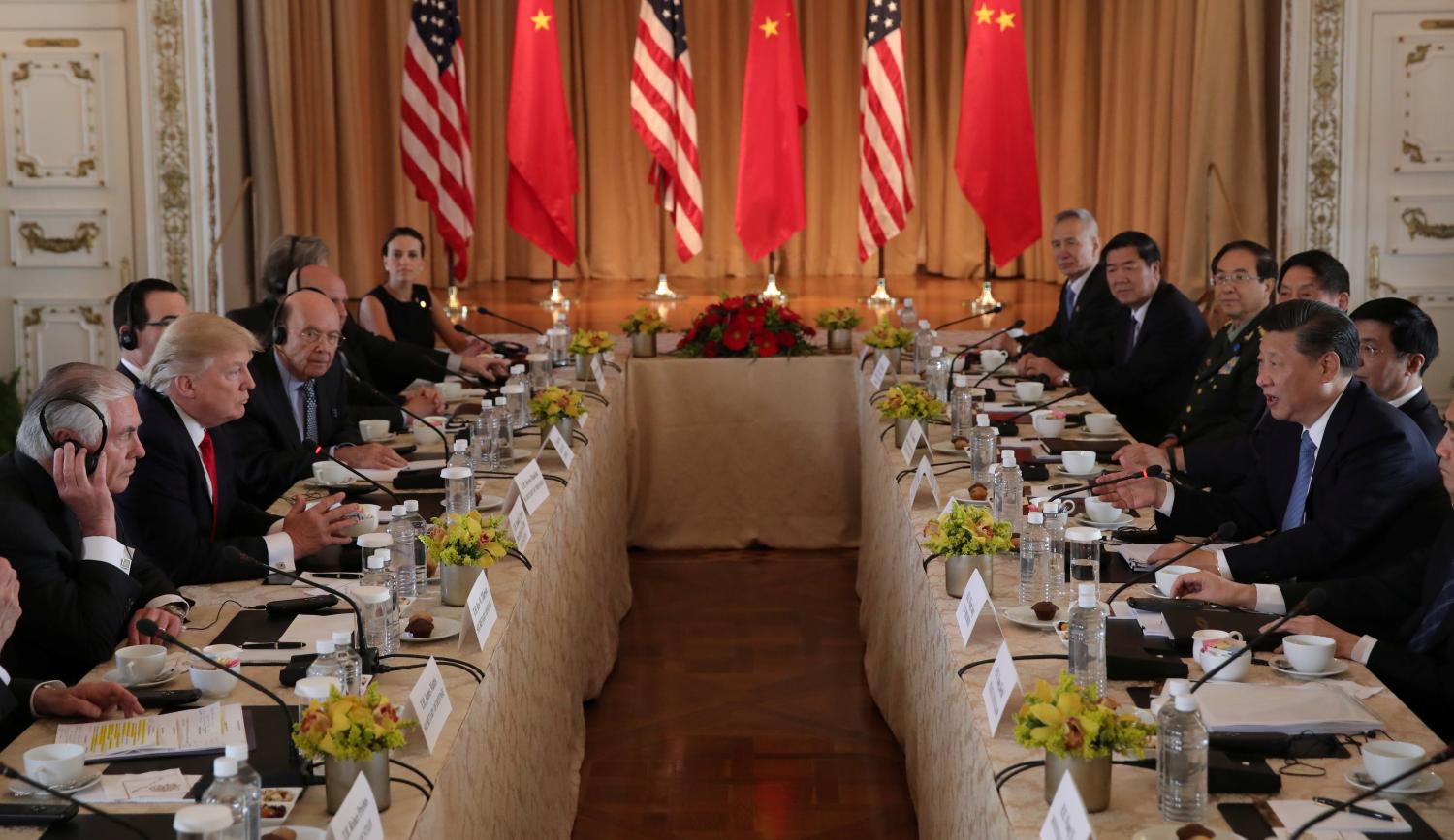
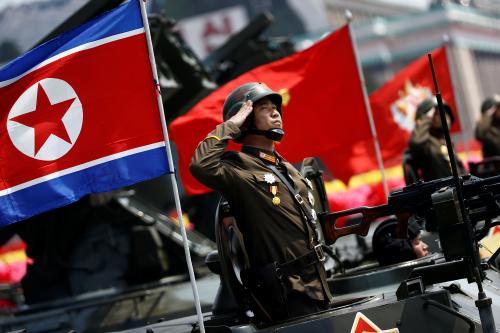
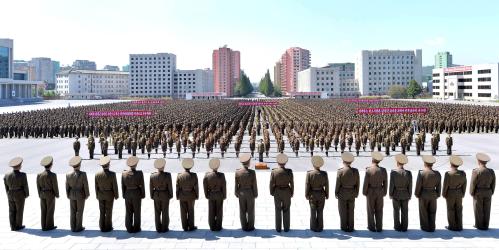
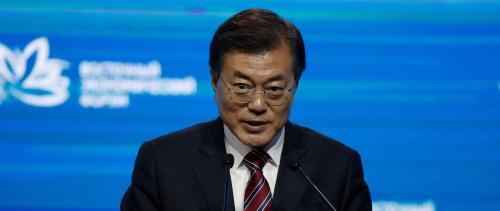


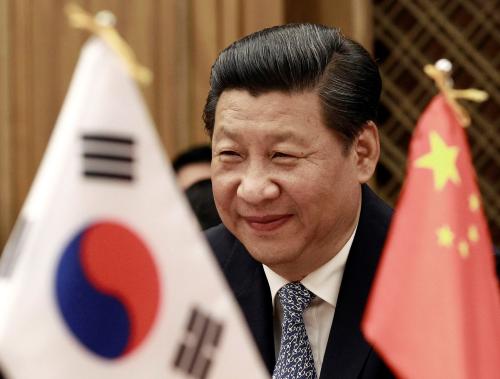
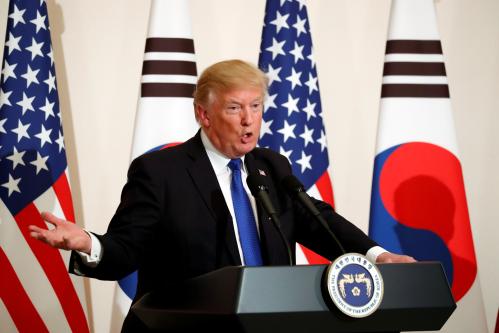
Commentary
What’s really driving Kim Jong-un’s behavior?
October 3, 2017